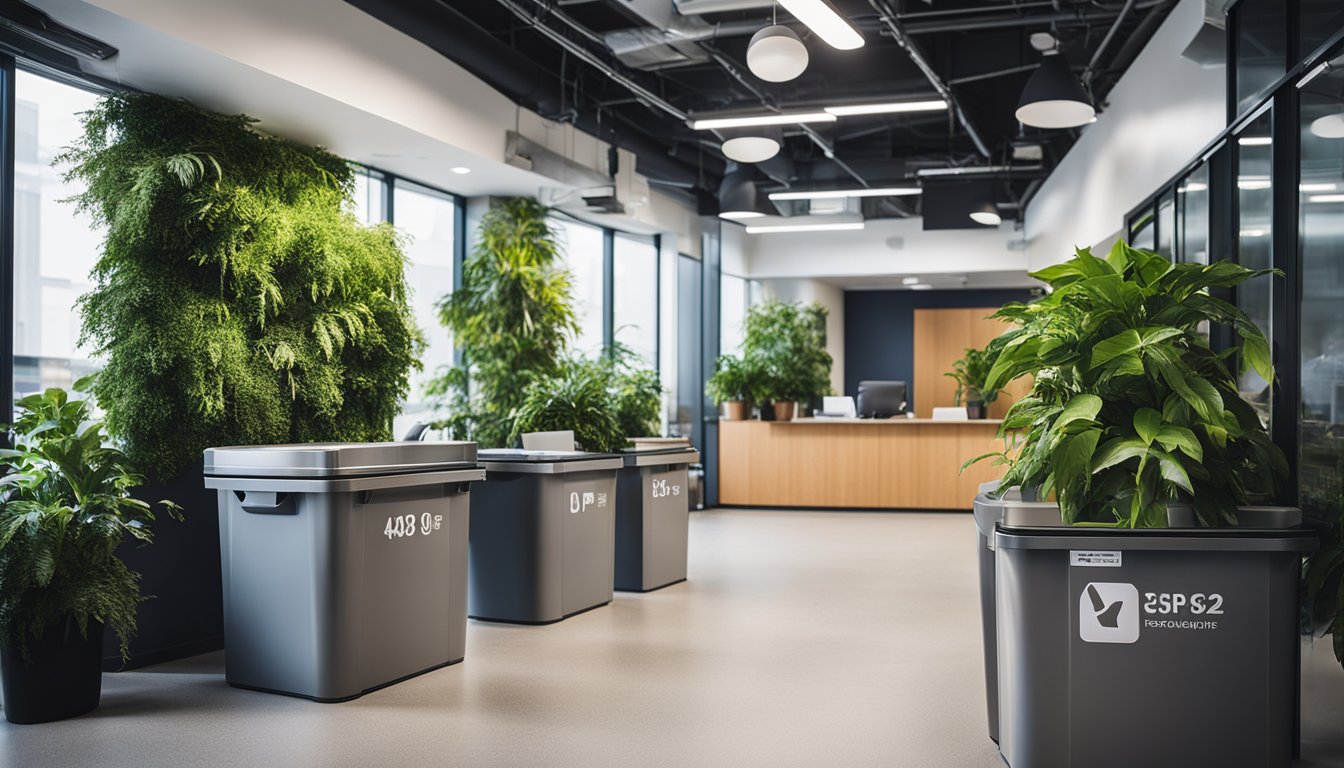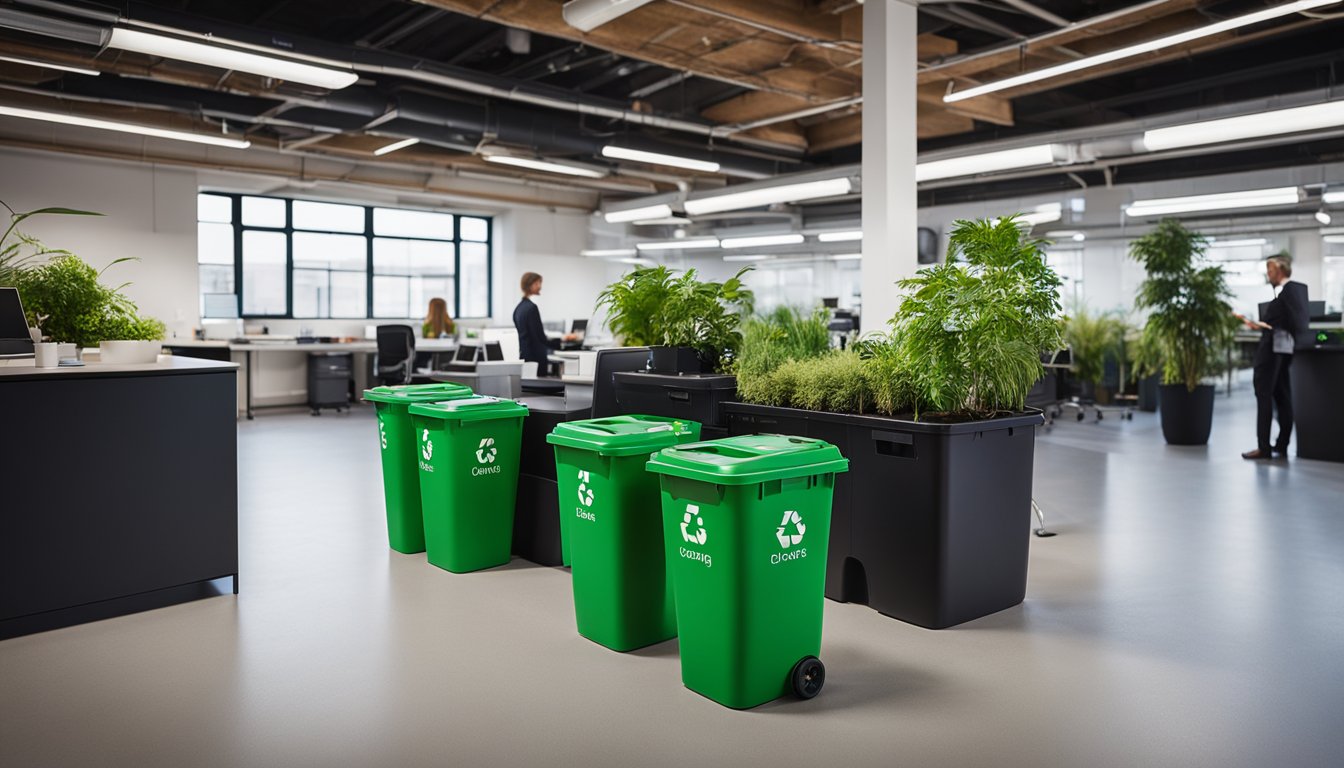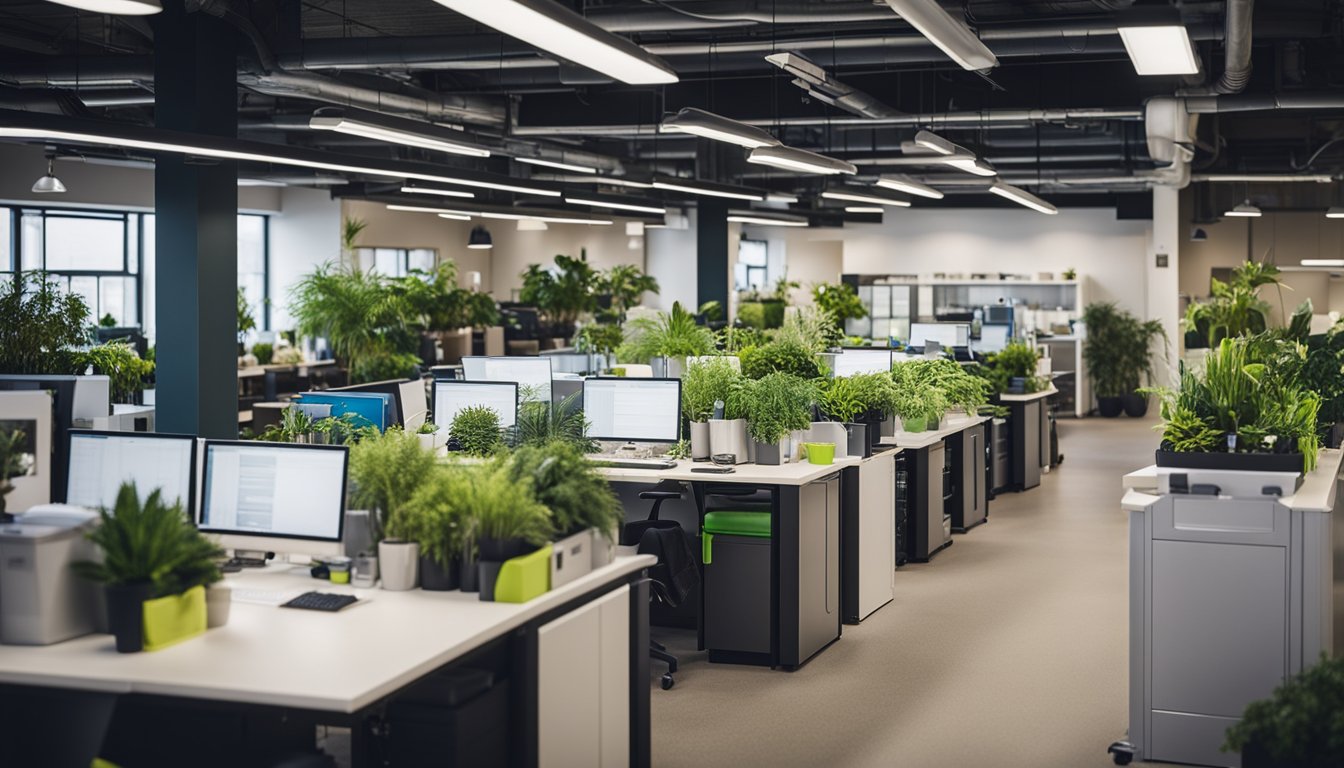Late updated: 23 Apr 2025 11:04
Written by: Amber Collins
Developing Eco-Conscious Habits in UK Workspaces: Promoting Sustainability and Efficiency
Creating eco-conscious habits in UK workspaces is no longer just a trend but a necessity. Adopting sustainable practices in the office can significantly reduce environmental impact while promoting a healthier and more productive work environment. By focusing on straightforward changes, such as using green energy and ensuring sustainable procurement, organisations can contribute to a more sustainable future.

As we explore the benefits of eco-friendly workspaces, it's critical to consider not just the environmental aspects but also how these changes positively affect employee well-being and business costs. Raising awareness about simple practices, like choosing deforestation-free paper and measuring carbon footprints, can transform office culture and inspire staff at all levels to engage in these vital practices.
The challenge lies in weaving these practices seamlessly into our everyday operations. From reminding colleagues to turn off lights to opting for eco-friendly cleaning products, every small step can create ripple effects that lead to a more sustainable workspace. The end goal is to develop a workplace culture that champions sustainability and empowers everyone to make a difference.
Key Takeaways
- Simple changes in work habits can reduce environmental impact.
- Eco-friendly practices benefit employee health and reduce costs.
- Creating a sustainable office culture inspires widespread engagement.
Fundamental Eco-Conscious Practices in UK Workspaces

In UK workspaces, adopting practices that minimise waste, reduce carbon emissions, and prioritise sustainable materials are crucial for fostering environmental sustainability. These approaches help mitigate the environmental impact, promote health and safety, and contribute to an efficient, eco-friendly workplace.
Minimising Waste and Promoting Recycling
Waste reduction and promoting recycling are essential in creating an eco-conscious office environment. Paper recycling bins should be accessible throughout the workspace to encourage use. Providing clear instructions on what can be recycled helps reduce contamination in the waste stream. Implementing digitalisation and remote working options can also reduce reliance on printed documents, further cutting down on paper waste.
Encouraging employees to bring reusable water bottles and coffee cups helps decrease plastic waste. Furthermore, initiating a food waste collection programme captures resources that would otherwise go to landfill. By fostering a culture aligning with the circular economy, companies demonstrate commitment to sustainability, empowering eco-conscious consumers and setting an example in environmental performance.
Reducing Carbon Footprint and Energy Consumption
To tackle our carbon footprint and reduce energy consumption, businesses can pursue various strategies. Beginning with an energy audit provides a clear understanding of existing consumption patterns. Switching to energy-efficient lighting and appliances can drastically lower energy use. Implementing motion sensors and timers ensures lights and electronics are off when not in use, contributing to energy-saving efforts.
Integrating renewable energy sources, like solar panels, reduces greenhouse gas emissions. Encouraging remote working options can also mitigate pollution from commuting. Simple actions, such as maintaining optimal thermostat settings, make an impact on energy efficiency. Collectively, these measures contribute to a measurable reduction in greenhouse gas emissions, aligning with environmental sustainability goals.
Choosing Sustainable and Eco-Friendly Materials
The selection of sustainable materials is vital in promoting an eco-friendly workspace. Prioritising products made from natural materials, such as sustainably sourced wood and recycled textiles, reduces reliance on non-renewable resources. Opting for eco-friendly products limits the risk of greenwashing, ensuring that choices genuinely support environmental sustainability.
Developing policies that require vendors to adhere to sustainable practices further reinforces this commitment. Educating employees on the significance of these materials promotes awareness and accountability in daily decisions. As the demand for sustainable products grows, companies that incorporate these innovative solutions distinguish themselves as leaders committed to environmental performance.
Enhancing Workplace Culture for Sustainability
Developing a sustainable workplace culture requires actively fostering social responsibility, engaging employees in behavioural change, and understanding environmental and economic impacts. By doing so, we can create a more efficient and environmentally friendly work environment that benefits both individuals and the planet.
Encouraging Social Responsibility and Environmental Stewardship
Incorporating social responsibility into our workplace practices plays a crucial role in promoting a sustainable future. We can start by embedding environmental stewardship into our company values and daily activities.
Community engagement initiatives, such as local clean-up events or biodiversity projects, can strengthen social equity. Providing employees with knowledge and resources on environmental psychology and water conservation empowers them to make informed decisions.
By supporting these actions, we encourage a culture of mindfulness and accountability. Recognising the consequences of human activities can help us reduce practices like deforestation and overconsumption, key contributors to the environmental crisis.
Changing Consumer Behaviour and Employee Engagement
To effect real change in consumer behaviour, we must engage our employees in sustainability efforts. By promoting eco-friendly commuting options and flexible work arrangements, we can improve both productivity and employee well-being.
Within the office, adopting a paperless approach and using eco-friendly products educate our workforce on sustainable alternatives. Hosting workshops or informational sessions about the fast fashion industry and the supply chain issues related to the garment industry raises consumer awareness about their choices.
Engaging employees through rewards or incentives for sustainable practices increases involvement and collaboration, leading to positive behavioural changes that align with our sustainability goals.
Addressing Broader Environmental and Economic Impacts
Understanding the broader impacts of our workplace decisions is essential. By examining our environmental footprint, we can contribute positively to global initiatives like the Paris Agreement. Evaluating the economic viability of our sustainability actions ensures we're not only environmentally conscious but also fiscally responsible.
We must consider how these efforts impact crime rates and job creation in the green sector. Supporting industries that focus on sustainable transport solutions or reducing the negative impact of fast fashion can be part of our strategy.
Working towards reducing biodiversity loss and addressing issues such as overconsumption positions us as leaders in tackling the environmental crisis. Through committed action, we can support a sustainable workplace culture that aligns with both ecological needs and economic realities.
Frequently Asked Questions

In this section, we address the practical strategies for creating eco-conscious workspaces in the UK. By focusing on waste reduction, resource conservation, energy efficiency, commuting initiatives, team culture, and corporate policies, we aim to outline comprehensive approaches for environmentally sustainable offices.
How can UK workspaces implement effective waste reduction strategies?
UK workspaces can adopt recycling programmes for paper, plastic, and electronic waste. Encouraging digital documentation and offering reusable alternatives to single-use items also play significant roles. Compost bins for organic waste can further enhance waste reduction efforts.
What are the best practices for resource conservation in an office environment?
Conserving resources starts with using energy-efficient lighting and appliances. Implementing water-saving fixtures and encouraging paperless operations can considerably conserve resources. Awareness campaigns about resource usage can be effective in engaging the entire office team.
In what ways can workplace design contribute to energy efficiency and sustainability?
Incorporating natural lighting and ventilation in workplace design significantly reduces energy consumption. Using sustainably sourced materials for furnishings and ensuring proper insulation helps maintain a comfortable office environment while lowering energy use.
What initiatives can businesses take to promote sustainable commuting among employees?
Businesses can offer incentives for carpooling, cycling, and public transport use. Installing bicycle racks and providing subsidies for public transit passes can support sustainable commuting. Remote work options and flexible hours can also decrease the need for daily commutes.
How can UK companies foster a culture of sustainability within their teams?
To foster sustainability, companies can integrate sustainability goals into their corporate vision. Conducting workshops and training sessions encourages eco-friendly practices among employees. Recognition programmes for sustainable actions can motivate the team to continuously adopt green habits.
What role do corporate policies play in advancing environmental sustainability in the workplace?
Corporate policies serve as a framework for sustainable practices. Policies can enforce energy-saving protocols, sustainable procurement guidelines, and waste management standards. Clear policies ensure consistency and accountability, driving the entire organisation towards environmental responsibility.
